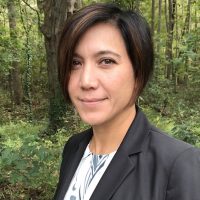Looking at the impact of COVID-19 on exclusive breastfeeding in Kenya and beyond
February 14, 2022
By Robert A. Poarch

Dr. Scott Ickes
Scott Ickes, PhD, has a unique perspective on the impact of COVID-19. A Gillings School of Global Public Health graduate (nutrition and epidemiology, 2010), Ickes has been working for the last four years on a National Institutes of Health research project that enables him to live six months out of each year in Naivasha, Kenya.
Working on the other side of the globe from where he teaches the rest of the year at Wheaton College in Illinois has allowed him to see firsthand, in two countries, the connection between economics and breastfeeding during a pandemic.
Connecting breastfeeding challenges to the workplace
Naivasha’s large flower farming industry — with more than 40 farms in the city — provides work for many women. Kenya also offers the research and health policy infrastructure Ickes needs to gather important data on a timely issue in maternal and child health.
“Kenya is the perfect case study of increasing women’s participation in the workforce coupled with stagnating breastfeeding rates,” said Ickes. “You have more women taking paying jobs, a growing economy, really good things happening for women’s empowerment and the policies to protect breastfeeding in the workplace. But there’s also a challenging implementation situation where many farms struggle to put in place the necessary and recommended supports that help working mothers to breastfeed. We hypothesized that the COVID-19 pandemic adds another layer to this ongoing challenge.”
Connecting to the Gillings School

Dr. Stephanie Martin
Looking for assistance on the project, Ickes turned to the Gillings School and reached out to Stephanie Martin, PhD, an assistant professor in the Department of Nutrition.
“Stephanie and I, along with a team of UNC students and colleagues in the Kilimanjaro Christian Medical University College in Moshi, Tanzania, have been working on a project about maternal employment and breastfeeding in sub-Saharan Africa. This new project was an extension of that effort,” said Ickes.

Dr. Aunchalee Palmquist
Ickes also works with Aunchalee Palmquist, PhD, MA, IBCLC, assistant professor in the Department of Maternal and Child Health and an affiliate of the Gillings School’s Carolina Global Breastfeeding Institute. Pamquist studies the intersectionality of perinatal maternal, newborn and young child health disparities globally and in the United States — with an emphasis on breastfeeding.
“One of my ethical reflections before engaging in international work is that I am being invited into a partnership,” said Palmquist. “Is it appropriately strengthening the priorities, the needs and the agendas of the folks who are going to be most impacted, which are the folks in Kenya we’re collaborating with? All of those things are important to me, and I’m really excited to be part of this project.”
Connecting COVID-19 to food insecurity
The initial study recruited mothers from more than 20 flower farms. The COVID-19-related portion prioritizes mothers who have delivered a baby since March 2020.
The work includes a 600-mother survey and a qualitative survey. Palmquist is supporting the ethnographic study along with investigators at the Kenya Medical Research Institute and University of Nairobi who are interviewing mothers, health care workers and employers to learn how COVID-19 has affected the breastfeeding experience for mothers.
One of the project’s initial findings revealed that mothers are describing a perceived sense of milk insufficiency due to food insecurity.
“We are seeing reports of low food security — where mothers lack consistent and affordable food due to the economic shocks of the COVID-19 pandemic,” said Ickes. “It’s affecting their sense of being able to adequately exclusively breastfeed their babies.”
Ickes acknowledges that the relationship between COVID-19 and breastfeeding needs further research and policy support, as many mothers are receiving conflicting messages and misinformation. His current study aims to assess how COVID-19 has influenced breastfeeding perceptions, attitudes and practices — and he feels a sense of urgency to get the findings published quickly.
“COVID-19-related research needs to be timely and efficient to respond to the pandemic that we’re in, as well as to plan for the future in terms of how these major economic and health shocks affect vulnerable populations and marginalized groups,” said Ickes. “I think the link to the Carolina Global Breastfeeding Institute can help this project to shape policy and improve global understanding about COVID-19 and breastfeeding.”
“I agree,” added Palmquist. “Public health research tends to lag behind the clinical science.”
Connecting two countries
Living in both the U.S. and Kenya while looking at the pandemic through the lens of breastfeeding has informed Ickes’ perspective of global health.
“Recognizing how governments can effectively support their citizens to prevent some of those hardships is great to see,” he said. “But we also appreciate that many societies struggle to garner the necessary resources to implement and leverage policies into timely action.”
“The issue about returning to work and support for breastfeeding is actually the same for high-income countries. Lack of paid leave is a major barrier for U.S. women,” said Palmquist. “In low- and middle-income countries, or countries in the Global South, there are policies that sometimes support lactation in the workplace or provide protections during the postpartum period — but those protections are usually limited to women working in the formal sector. It doesn’t trickle down to women who are working in much more difficult situations.”
Ickes believes the work in Naivasha will serve as a model for how not only commercial agriculture, but similar industries around the world, can support breastfeeding for mothers, especially when events like COVID-19 worsen food insecurity.
“I think that there really is that need,” said Ickes. “Given what we’re experiencing in high-income countries, I believe this work will be broadly helpful in any context where we see this nexus of employment and childcare; trying to manage COVID restrictions while supporting breastfeeding.”
Contact the UNC Gillings School of Global Public Health communications team at sphcomm@unc.edu.
